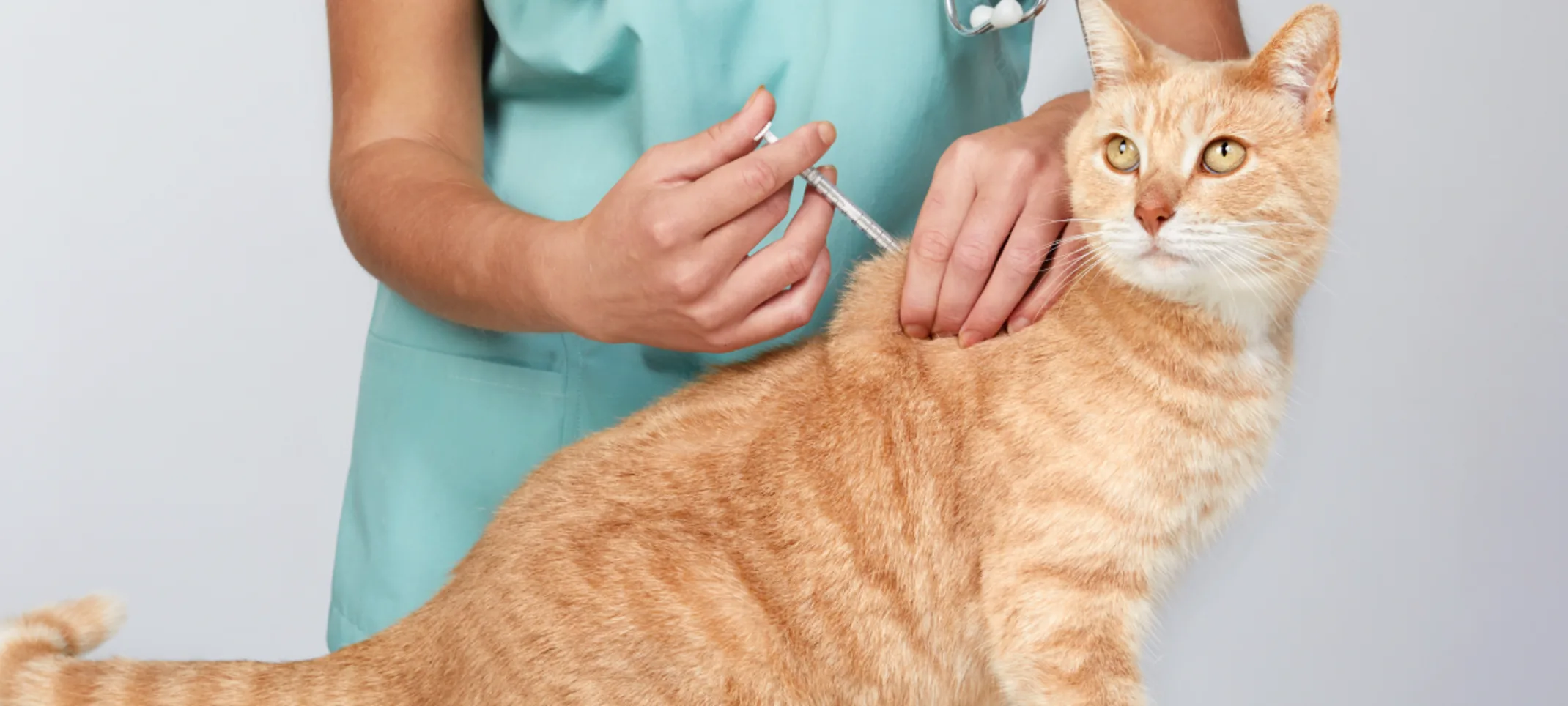Court Street Animal Hospital
Vaccinations
Court Street Animal Hospital believes preventative care is an important aspect in maintaining your pet’s health. Proper vaccination is vital in protecting them against harmful diseases.

Overview
We believe that preventative care is one of the most important aspects of maintaining your pet’s health. There are a variety of diseases that affect animals, so proper vaccination of your pet is vital in protecting them from the many types of illnesses to which they are susceptible to.
Why are vaccinations important?
Vaccinations are vital to the health and protection of your pet, and serve as a preventive measure in combating viral diseases like Parvovirus, Parainfluenza virus, Distemper, Lyme, Panleukopenia, Feline Leukemia Virus, and Rabies.
When should my pet get vaccinated?
Vaccinations are particularly important for puppies, kittens, and other young animals that have immature immune systems. Veterinary vaccinations generally begin at 6-8 weeks of age and then boostered throughout your pet’s life depending on the vaccine. Our doctors will determine the appropriate vaccination plan for your pet.
Here at the Court Street Animal Hospital, we take your pets' health very seriously. We strongly believe that preventative medicine is the key to your pets' long and healthy life. Vaccination against common and dangerous diseases is the foundation of any wellness program but recent, well-respected, and irrefutable studies have shown that for many pets yearly vaccination with some types of vaccines is not necessary. Though we strongly believe in the importance of vaccination we have adopted newer protocols which balance the need for immunity with the desire to take advantage of the full duration of protection conferred by every dose of vaccine. Below we present the improved vaccine protocol for your dog or cat. Changes to this plan may be recommended based on your pets' lifestyle and degree of exposure to risk.
Vaccination Protocol for Dogs
Rabies: This deadly disease is readily transmitted to humans and Massachusetts state law mandates that all domestic animals be vaccinated regularly against it. Failure to comply with these laws can result in confiscation, quarantine, or even destruction of your pet by the state. The canine Rabies vaccine may be given as infrequently as every three years. It is very important to not let your dog become overdue on this vaccine since the state makes no distinction between a dog that is one week or one year behind schedule. Also, dogs that come into contact with wild animals should have their immunity boosted following an exposure even if it has not been a full 3 years since their last vaccination.
Distemper (DHPP): This vaccine protects against the common, serious diseases Canine Distemper, Canine Viral Hepatitis, Canine Parvovirus, and Canine Parainfluenza. We recommend a series of three puppy boosters beginning at about 6-8 weeks and then given every 3-4 weeks until your puppy is greater than 14 weeks. Then we recommend a yearly vaccine at 1, 2, and 3 years of age. Thereafter we recommend that this vaccine be administered every three years (instead of yearly) for the rest of your dogs' life.
Lyme: This vaccine protects against the common disease transmitted through tick bites. This vaccine should be administered yearly to dogs with exposure to tick-infested areas. The vaccine is very safe but does not provide complete protection. We strongly recommend that dogs receiving this vaccine also have a tick preventative such as Frontline applied to their skin monthly during the warm months of the year.
Bordatella (Kennel Cough): This is an intranasal (nose-drop) vaccine which protects against the highly infectious organism which causes Kennel Cough. Most boarding or "doggie day care" facilities will require that dogs receive this vaccine prior to entry. It is also strongly recommended for dogs that are groomed frequently or are frequent visitors to a dog park. This vaccine lasts only for 6 or 7 months so owners should plan ahead to ensure that each administration of the vaccine will protect their pet for foreseeable potential future exposures.
Leptospirosis: This disease is often deadly to dogs, and is transmissible to humans where it can cause miscarriage in pregnant women. Current vaccines may provide immunity for less than a year so dogs with potentially high exposure may need more than yearly vaccination. Dogs that are frequently kenneled, attend dog shows, swim, hunt, or have access to wildlife areas are at greater risk.
We recommend a fecal examination and any necessary deworming medications at every yearly visit for all dogs.
Vaccination Protocol for Cats
Rabies: This deadly disease is readily transmitted to humans and Massachusetts state law mandates that all domestic animals be vaccinated regularly against it. Failure to comply with these laws can result in confiscation, quarantine, or even the destruction of your pet by the state. Rabies vaccine is available as either a yearly or a three-year vaccine. We try to give the vaccine with the longest duration possible while still complying with state Rabies laws. This is a safe and very effective vaccine.
Distemper (FRCP): This vaccine protects against the common, serious feline diseases Feline Rhinotracheitis, Feline Calicivirus, and Feline Panleukopenia. We recommend a series of three injectable kitten boosters beginning at about 6-8 weeks and then given every 3-4 weeks until your kitten is greater than 14 weeks. Thereafter we recommend a yearly administration of the intranasal formulation of this vaccine for the rest of your cat's life.
Feline Leukemia: This vaccine protects against the Feline Leukemia Virus. This deadly virus, closely related to HIV, is carried by wild and stray cats and is readily transmitted through grooming, fighting, and mating to cats that go outdoors. Though we strongly recommend that all domestic cats stay indoors, those that do venture out should be vaccinated yearly against this disease.
We recommend a fecal examination and any necessary deworming medications at every yearly visit for any cats which go outdoors.
